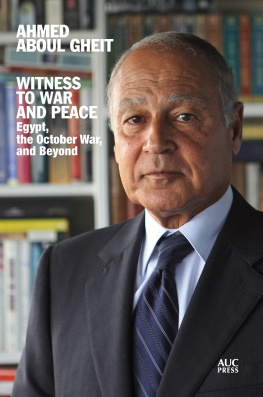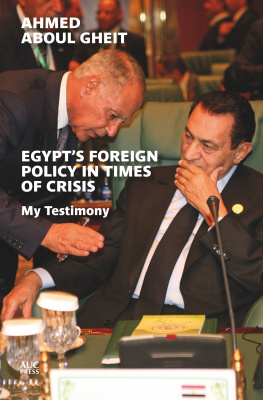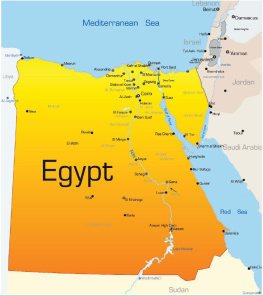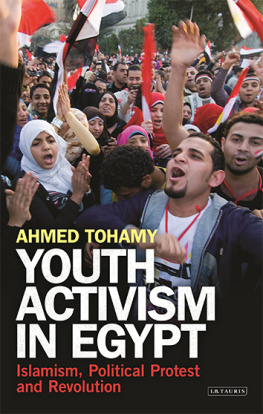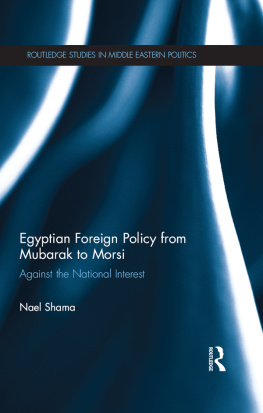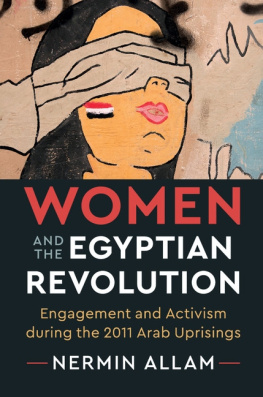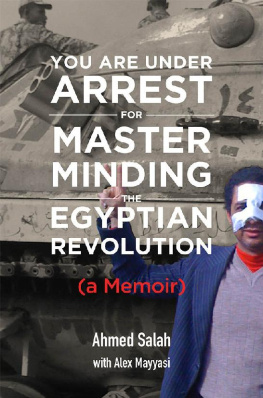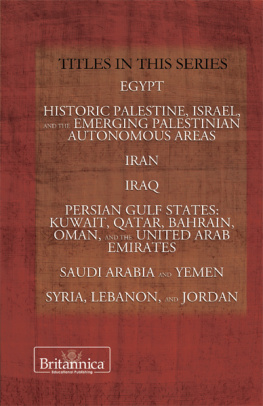WITNESS TO WAR AND PEACE
This electronic edition published in 2018 by
The American University in Cairo Press
113 Sharia Kasr el Aini, Cairo, Egypt
420 Fifth Avenue, New York, NY 10018
www.aucpress.com
Original title: A Witness to War and Peace
Copyright 2013 Nahdet Misr Publishing House All rights reserved.
Published in English by AUCP with permission from Nahdet Misr Publishing House
21 Ahemd Orabi St., El-Mohandseen, Cairo, Egypt.
All rights reserved.
All rights reserved. No part of this publication may be reproduced, stored in a retrieval system, or transmitted in any form or by any means, electronic, mechanical, photocopying, recording, or otherwise, without the prior written permission of the publisher.
ISBN: 978 977 416 885 7
eISBN: 978 161 797 894 4
Version 1
CONTENTS
To the memory of my father the pilot, Major-General Ali Ahmed Aboul Gheit, who said, My son will be foreign minister, when I was still a young man.
To my mother, Fatima Mohamed al-Messiri, who took good care of me.
To my wife and lifelong companion, Leila Kamal al-Din Salah, who stood staunchly by me in all my many struggles.
To my sons, Kamal and Ali. How sweet it is to have loving and loyal sons.
To all those under whose leadership I have worked and whose advice I have taken.
To all those who have worked with me over the years, with mutual affection and a shared passion for our country, for which we have always been willing to give our all.
Thank you.
The arrogance of power... deluded some of us... [in]to the belief that they were capable of not only writing history but also rewriting it to alter its facts and ignore its lessons.
From Ambassador Ahmed Aboul Gheits statement before the
Fifty-Ninth Session of the United Nations General Assembly, September 24, 2004, describing Israels positions throughout
its wars and negotiations with the Arabs
FOREWORD
to the English Edition
Francis J. Ricciardone
President, The American University in Cairo
Ahmed Aboul Gheit is one of the last of the living giants of Egyptian statecraft whose lives have spanned the end of the Egyptian monarchy, the establishment of the modern Republic of Egypt through successive revolutions and elections, the establishment of the State of Israel, and the several wars and still unfolding story of the complex peace between those two modern states and their neighbors. During this period, modern successor states to the Ottoman Empire, from North Africa through the Gulf, have arisen, and some have collapsed. In several cases, most notably that of the Palestinians, people of former Ottoman lands continue to struggle to establish fully independent states or, in the case of the Kurds, more or less autonomous sub-state polities. The dynamics between Egypt and Israel have always proven pivotal and central to the fate of the entire region. The future of Palestine, in particular, certainly hangs in that balance.
The great modern drama of state genesis and failure across MENA has engendered rich scholarly documentation and study, particularly in English. Yet, firsthand memoirs by leading Egyptian players are scarce, even in Arabic. Hence, much of even the most insightful analysis of Egyptian decision-making through Egypts succession of modern wars and crises amounts to commentary by keen observers at some distance in time and space from the Egyptian figures themselves. The past great leaders in modern EgyptianIsraeliPalestinian and broader Arab affairsPresidents Nasser, Sadat, and Mubarakregrettably have left scholars no published memoirs comparable to the records published by their Israeli or American counterparts and their senior diplomatic and military advisors. As Aboul Gheit has pointed out, other influential statesmen of the inner decision-making circle around Presidents Sadat and Mubarak, such as Osama al-Baz and Ahmed Maher al-Sayed, have each passed away without having recorded their testimonies of this dramatic period in global affairs. Such historical personal diaries or archival official documentation as the presidents and their senior advisors may have generated are not readily available even to the most reputable private scholars, as a matter of Egyptian state policy. Aboul Gheit cites the absence of published memoirs as what compelled him to record his own direct observations.
Hence, Ahmed Aboul Gheits Witness to War and Peace would be of unusual importance to Arab and international scholars if only for the scarcity of other documentation, especially as published in English, by Egyptian participants in, and witnesses to, leadership decision-making in the era of war and peace, and in the genesis and failure of post-Ottoman and other foreign imperial-era states and aspirant states. But his work also stands out for its candor and authenticity, based on contemporary personal notes recording his own thinking and reactions to major historical developments.
Aboul Gheits record of the personalities and thinking of Egypts top decision makers in times of crisis is fascinating for its intimacy and contemporaneity. These influential figures are too little known even to the rising generation of Egyptians, much less to foreigners. But of equally compelling value to the student of modern Egyptian and regional history is Aboul Gheits presentation of his own personality and analytical outlooks as a proudly Egyptian nationalist and statesman.
I was a young American student of foreign and regional affairs, and a very junior American diplomat, during most of the period that Aboul Gheit chronicles in Witness to War and Peace. Only later, as I returned to Cairo in 2005 as the U.S. ambassador, did I have the good fortune to meet and work closely with Aboul Gheit, by then several years into what later would extend to a seven-year tenure as foreign minister of Egypt. The rare privilege of observing how his deep erudition and patriotism shaped his dealings with foreign counterparts, particularly of my own country, proved profoundly illuminating.
Aboul Gheits lifetime of continuing national service is as exceptional for its distinction as for its lengthyet it authentically represents the characteristic Egyptian traits of deep faith, perspicacity, tenacity, and resilience. His close accounts certainly offer important insights for the rising generation of Egyptians and others who can access Aboul Gheits original Arabic editions. But those insights will be of particular value to foreign diplomats, business people, scientists, and scholars, who recognize the importance of deep understanding of this unique, pivotally important, and complex country, as the fundamental requirement for successful engagement with it in any sphere of endeavor. In the service of that high purpose, the American University in Cairo Press is proud to make Ahmed Aboul Gheits Witness to War and Peace available to a wider global readership through this English edition.
FOREWORD
to the Arabic Edition
Ambassador Mohamed Assem Ibrahim
Former Egyptian ambassador to Ethiopia, Kenya, Sudan, and Israel
Dear Reader,
It is a great honor to introduce you to this book, a true achievement. In writing this, I have a threefold responsibility: to the reader, to this profound and multidimensional book, and finally, to the author, a lifelong friend.
I shall start with the author. For seven years, we knew him as the foreign minister of Egypt. Preceding this were four decades of loyal service to the diplomatic corps, a steady rise through the ranks culminating in his position as the most senior ambassador and Egypts permanent representative to the United Nations.
I met Ahmed Aboul Gheit more than half a century ago. We started secondary school together, and met regularly at the Armed Forces Officers Clubour fathers were both officers, his in the air force and mine in the artillery corps. We shared a passion for public affairs that started in 1958. Like all of our generation in that tumultuous era, which started with the 1952 revolution, then witnessed the British withdrawal, the nationalization of the Suez Canal, followed by the Tripartite Aggression in 1956, the union with Syria, and other events that are common knowledge, we dreamed of a new dawn for Egypts role in the world, a date, as the phrase goes, with destiny.

